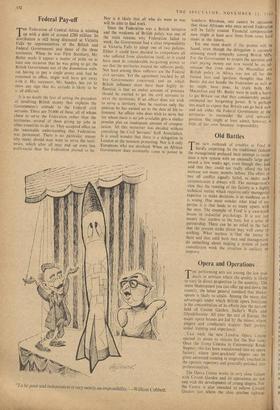Federal Pay-off - T liE Federation of Central Africa is winding
up with a debt of around £280 million. Its distribution is still being discussed at Victoria Falls by representatives of the Witish and Federal Governments and those of the three territories. When he was First Secretary, Mr. Butler made it appear a matter of pride on at least one occasion that he was going to get the British Government out of the dissolution with- out having to pay a single penny and, had he remained in office, might well have got away with it. His successor, Mr. Sandys, has yet to show any sign that his attitude is likely to be a: all different.
It is no doubt the fear of setting the precedent of involving British money that explains the Government's attitude to the Federal civil servants. There are 35,000 of these, all of whom chose to serve the Federation rather than the territories, several of them giving up jobs in other countries to do so. They accepted office on the reasonable understanding that Federation was permanent. There is no particular reason why many should now want to serve the terri- tories, which after all may end up even less multi-racial than the Federation proved to be.
Nor is it likely that all who do want to stay will be able to find work.
Since the Federation was a British initiative and the weakness of British policy was one of the main reasons why Federation failed to work, the Government had a clear responsibility at Victoria Falls to adopt one of two policies. Either it could have decided to compensate all who suffered from dissolution itself, or it could have used its considerable bargaining power to see that the territories treated the sufferers justly. Not least among these sufferers are the Federal civil servants. Yet the agreement reached by all five Governments concerned, and on which British influence must have been highly in- fluential, is that an undue amount of pressure should, be exerted to get the civil servants to serve the territories. If an officer does not wish to serve a territory, then he receives only the pension he has earned up to the date of his re- tirement. An officer who does Wish to serve but for whom there is no job available gets a similar pension plus an inadequate amount of compen- sation. All this moreover was decided without consulting the Civil Servants' Staff Association. It is small wonder that there is a delegation in London at the moment protesting. Nor is it only Europeans who are involved. When an African Government does eventually come to power in 'To be poor and independent is very nearly an impossibility.'—William Cobbett. Southern Rhodesia, one cannot be optimistic that those Africans who once served Federation will be .fairly treated. Financial compensation now might at least save them from some hard times in the future.
Yet one must doubt if the protest will be heard, even though the delegation is currently arousing much sympathy among British NIPS. I or the Government to reopen the question and slart paying money out now would he an id mission that even under the Macmillan era British policy in Africa was not all for the limited best and (profane thought) that Mr. I3utler did not handle the Federation as ■% ell as he might have done. In truth both Mr. Macmillan and Mr. Butler were in such a hurry to get Britain out that they considerably under- estimated her bargaining power. It is perhaps too much to expect that Britain can go back now and ask either the Federal Government or the territories to reconsider the civil servants' position. She might at least admit, however. a little of her own financial responsibility.


































 Previous page
Previous page